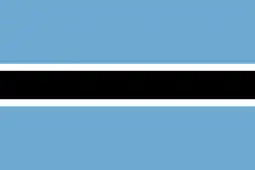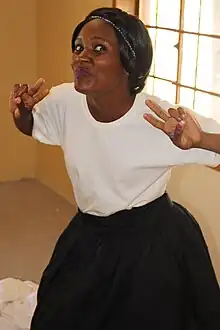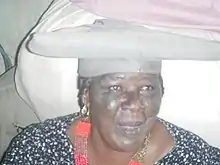Ethnic groups in Botswana
The population of Botswana is divided into the main ethnic groups of Tswana people (73%), Kalanga people (18%), and Basarwa (or Bushmen) (2%).[1] The remaining 7% consist of other peoples,[2] including some speaking the Kgalagadi language, and 1% of non-African people.[1]
| Part of a series on the |
| Culture of Botswana |
|---|
 |
| People |
| Languages |
| Cuisine |
| Religion |
| Art |
| Literature |
| Music |
| Sport |
About 73% of the total population speak Setswana as second and first language. The ethnic Tswana is split up among eight tribes: Bangwato, Bakwena, Bangwaketse, Bakgatla, Barolong,Batlokwa,Balete and Batawana. The remaining users of Setswana as a second language constitute the non-Tswana people,that is BaKalanga,Ovaherero,Veekuhane,Bakgalagari,etc.
People of Botswana
All citizens of Botswana-regardless of colour, ancestry or tribal affiliation are known as Batswana (plural) or Motswana (singular). In the lingua franca of Tswana, tribal groups are usually denoted with the prefix 'ba', which means 'the people of...'.Therefore, the Herero are known as Baherero, and the Kgalagadi as Bakgalagadi, and so on. Botswana's eight major tribes are represented in the House of Chiefs, an advisory legislative body.[3]
Bakalanga

Botswana's second largest ethnic group are the Bakalanga, who mainly live in northeastern,north central as well as central parts of Botswana and Western Zimbabwe and speak Kalanga. In Botswana they are based mainly, although not exclusively, around Francistown. Modern Bakalanga are descended from the Kingdom of Butua.[6]
Herero

The Herero probably originated from the eastern or central Africa and migrated across the Kavango River into northeastern Namibia in the early 16th century. In 1884 the Germans took possession of German south west Africa (Namibia) and systematically appropriated Herero grazing lands. The ensuing conflict between the Germans and the Herero was to last for years, only ending in a calculated act of genocide which saw the remaining of the tribe flee across the border into Botswana. The refugees settled among the Batawana and were initially subjugated, but eventually regained their herds and independence. These days the Herero are among the wealthiest herders in Botswana.[7]
Basubiya
The Basubiya, Wayeyi and Mbukushu are all riverine peoples scattered around the Chobe and Linyanti rivers and across the Okavango pan-handle. Their histories and migrations are a text book example of the ebb and flow of power and influence. For a long time, the Basubiya were the dominant force, pushing the Wayeyi from the Chobe river and into the Okavango after a little spat over a lion skin, so tradition says. The Basubiya were agriculturists and as such proved easy prey for the growing Lozi Empire (from modern Zambia), which in turned collapsed in 1865. They still live in the Chobe district.
References
- "Ethnic groups - Botswana". nationsencyclopedia.com. 2012. Retrieved 15 June 2012.
- "CIA - The World Factbook". cia.gov. 2012. Retrieved 16 June 2012.
- Parsons, Neil (25 September 2017). "Botswana". Encyclopædia Britannica. Encyclopædia Britannica, inc. Retrieved 11 October 2017.
- McIntyre, Chris (2007). Botswana: Okavango Delta, Chobe, Northern Kalahari, 2nd: The Bradt Travel Guide Paperback. Bradt Travel Guides. ISBN 978-1841621661.
- Statistics, Botswana. "Population and Housing Census 2011 Dissemination Seminar" (PDF). Statistics Botswana. Archived (PDF) from the original on 9 October 2022.
- Morton, Fred; Ramsay, Jeff; Mgadla, Part Themba (2008). Historical Dictionary of Botswana. Scarecrow Press. pp. 158–160. ISBN 9780810864047. Retrieved 22 February 2018.
KALANGA (BAKALANGA, also VAKALANGA)....the BaKalanga historically live primarily in northeastern Botswana and adjacent western Zimbabwe and speak IKalanga, a language closely related to ChiShona...The BaKalanga constitute the largest non-SeTswana-speaking element in Botswana....The modern BaKalanga are descended from the core element of the Butwa kingdom....
- Harpending, Henry; Pennington, Renee (1990). "Herero Households". Human Ecology. 18 (4): 417–439. doi:10.1007/bf00889466. S2CID 189880453.
- Planet, Lonely. "People of Botswana in Botswana". Lonely Planet. Retrieved 17 March 2018.